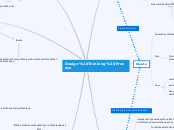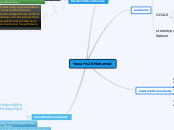Design Thinking Process
Ask users to compare
Create Experiences
Test the prototype to gain experience
Show don’t tell
Put the prototype in the user’s hands
To refine your POV
To learn more about your user
To refine prototypes and solutions
It is when we solicit feedback
Example
Test
Test them on kids and get feedback
Little skinny toothbrush
Make a small toothbrush with a small hand
Kids are not able to hold the toothbrush proberly
They are kids
They have small hands
Empathize
Watch and Listen
Engage ‘interviewing’
Observe
To observe others' point of view
Put yourself in others shoes
Prototype
Build with the user in mind
ID a variable
Don’t spend too long on one prototype
Start building
To manage the solution-building process
To test possibilities
To fail quickly and cheaply
To start a conversation
To communicate
To ideate and problem-solve
iterative generation of artifacts intended to answer questions
Ideate
How
bodystorming, mindmapping, and sketching
building prototype
combining conscious and unconscious
Why
Moving from identifying the problem to creating solutions
Get obvious solutions
Create fluency and flexibility
Uncover unexpected areas
Harness the collective perspectives
Step beyond obvious solutions
Generating ideas and solutions
Define
How to define
Articulate a POV
Informs criteria for the ideas
Inspires the team
Provides focus and frames the problem
Captures the hearts and minds of people
Empowers the team to make decisions independently
Explain insighs
Asking relative question
It is the best understand of other people's POV
Reveals powerful insights
Guiding, explaining statement









